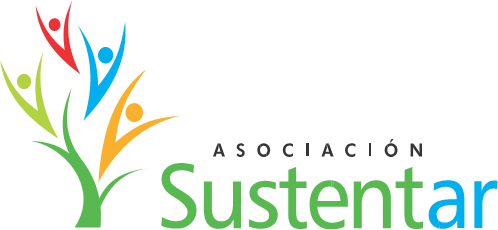
The Transport Community of Practice (GoP Transport), in partnership with the Regional Platforms of the Global Climate Action Partnership - GCAP (formerly known as LEDS GP), is building a resilient, low-emission transport community globally, supporting champions and innovators, linking networks of low-emission transport experts and exploring opportunities for collaboration at local and regional levels.
We invite all interested parties to participate in the Transportation CoP by completing the following survey
Aligned with the objectives of the Global Climate Action Partnership - GCAP (formerly known as LEDS GP), the LEDS LAC Transport CoP pays special attention to providing value to countries for:
The CoPT coordinated by the Regional Platform for Latin America and the Caribbean (LEDS LAC) has been working since 2014, providing support for capacity building, and improving the design and implementation of NDCs in the region, on the priority issues identified by its members, through its two Communities of Practice (CoP): CoP Electric Mobility and CoP Sustainable Logistics.
The objective of this session was to review the activities carried out by the Transportation Working Group and the Resource Efficiency Working Group in 2023, and to promote active participation in the groups. In addition, the experience of "La Rolita", an outstanding example of mass transit in Bogota and its surroundings, recognized for its 100% electric fleet and its commitment to gender equality in driving roles, was presented. the support of resilient and low-emission strategies, presenting case studies and results from partners and countries around the world.
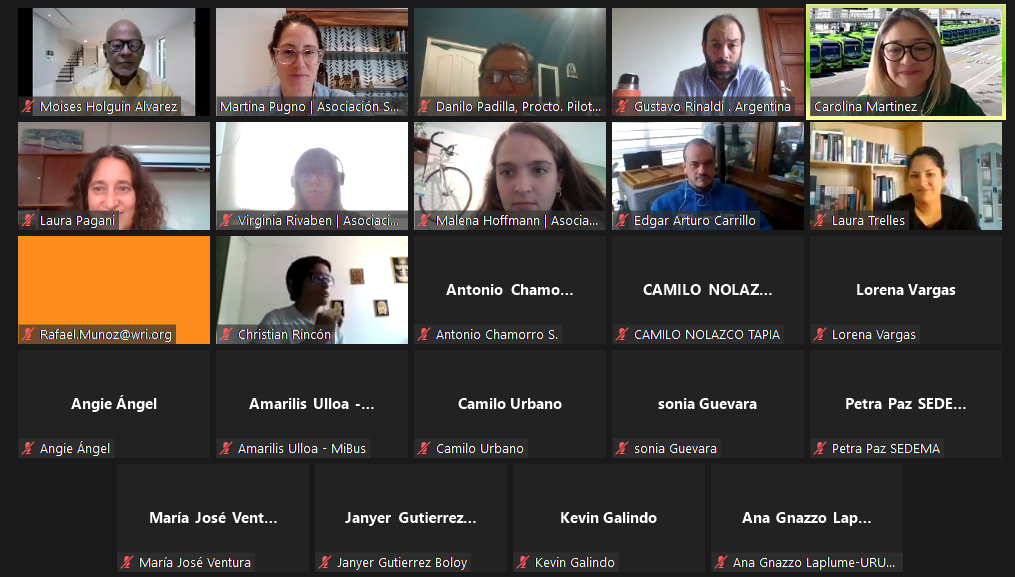
Co-organizers: Renewable Energy Policy Network (REN21), International Association of Public Transport (UITP), International Union of Railways (UIC), Sustentar Association; Transport Working Group (TWG); Resource Efficiency Working Group (REWG).
This event explored how renewables and transportation can jointly address global climate goals. A panel of experts delved into the challenges and opportunities around systemic decarbonization of the transport sector and highlighted strategies to accelerate renewable energy deployment, as well as the benefits of circularity and life cycle optimization.
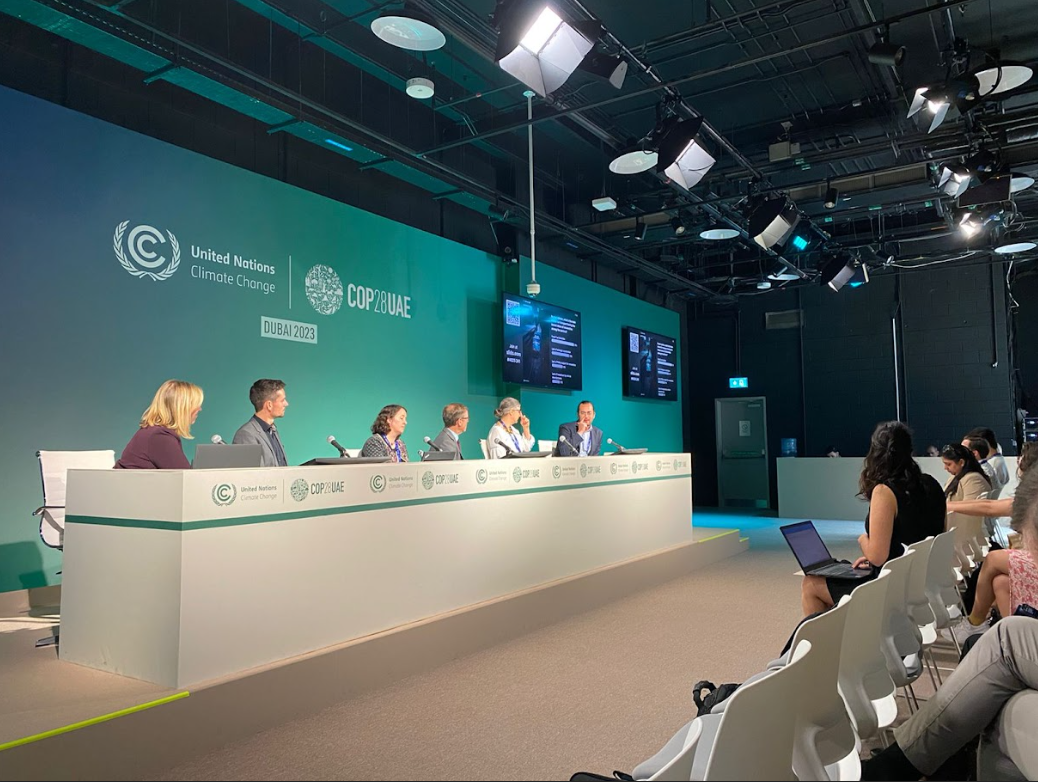
Organizers: National Renewable Energy Laboratory, Alliance for Sustainable Energy (NFREL), Sustentar Partnership; Transportation Working Group (TWG); Resource Efficiency Working Group (RWG)
This exhibition aimed to highlight progress towards Net Zero through active collaboration and support for resilient and low-emission strategies, presenting case studies and results from partners and countries around the world.
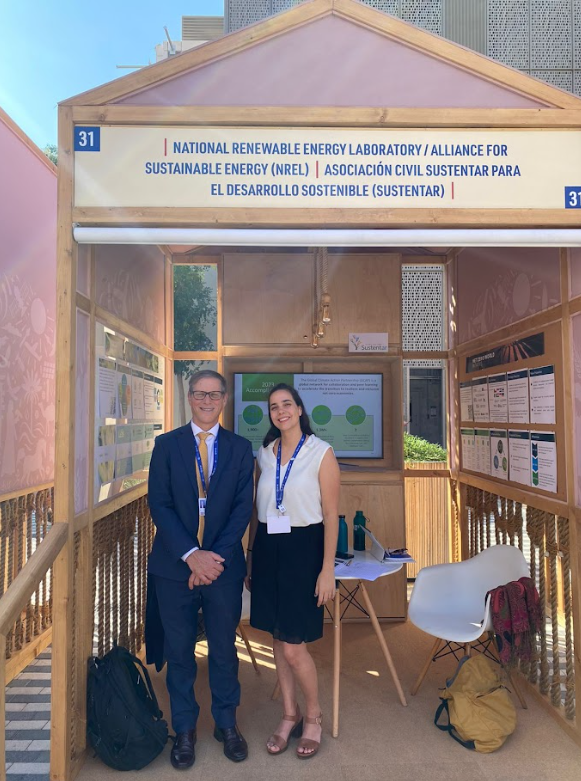
Organizers: Climate and Clean Air in Latin American Cities - Plus Program (CALAC+) and the Electric Mobility Community of the LEDS LAC Transportation Working Group (TWG).
This event aimed to share outstanding experiences in the implementation of zero-emission buses in Latin America. It also sought to create a space to share information on national and international funding sources with representatives of public transportation systems, as well as to inform about the various government incentives aimed at reducing the total cost of ownership.
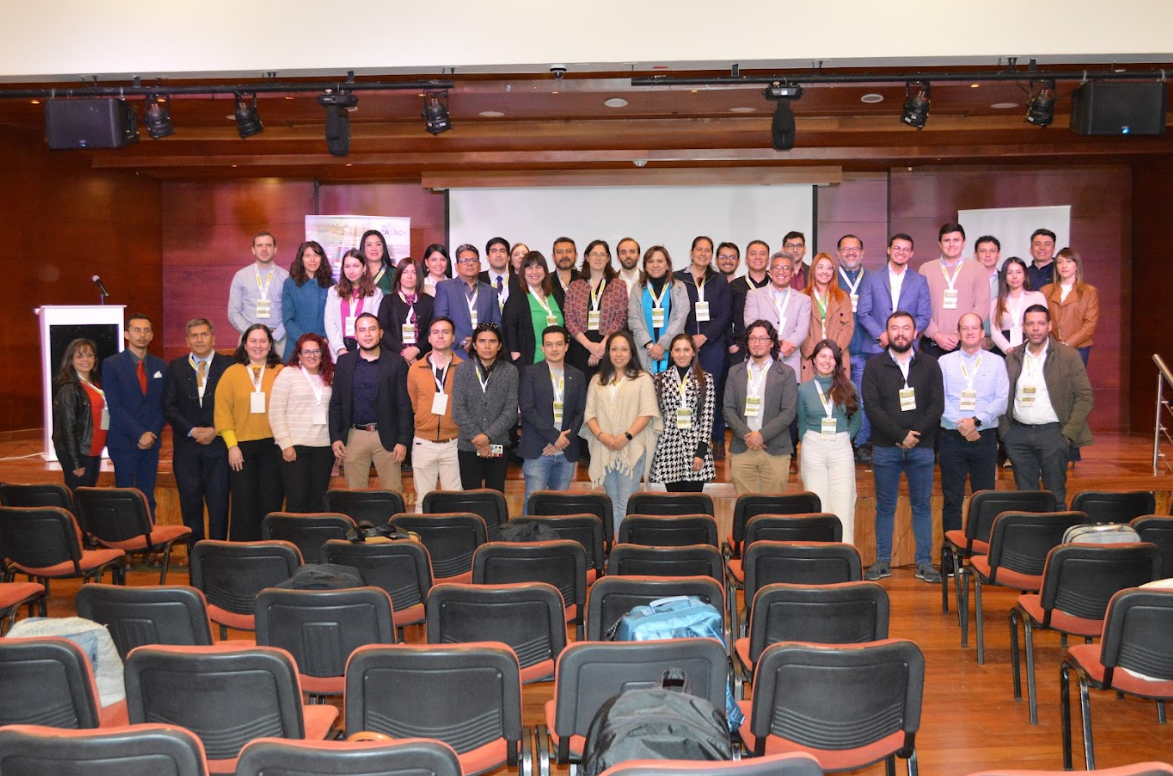
Organizers: LEDS LAC Transportation Working Group (TWG) - LEDS LAC Resource Efficiency Working Group (RWG) - LEDS LAC Resource Efficiency Working Group (RWG)
In this session leading experts and participants explored the needs and opportunities in the transportation sector, highlighting the need to use resources efficiently. Although often underestimated, this perspective offers great potential for improving energy efficiency, rethinking infrastructure and technology, and achieving sustainability in transportation.
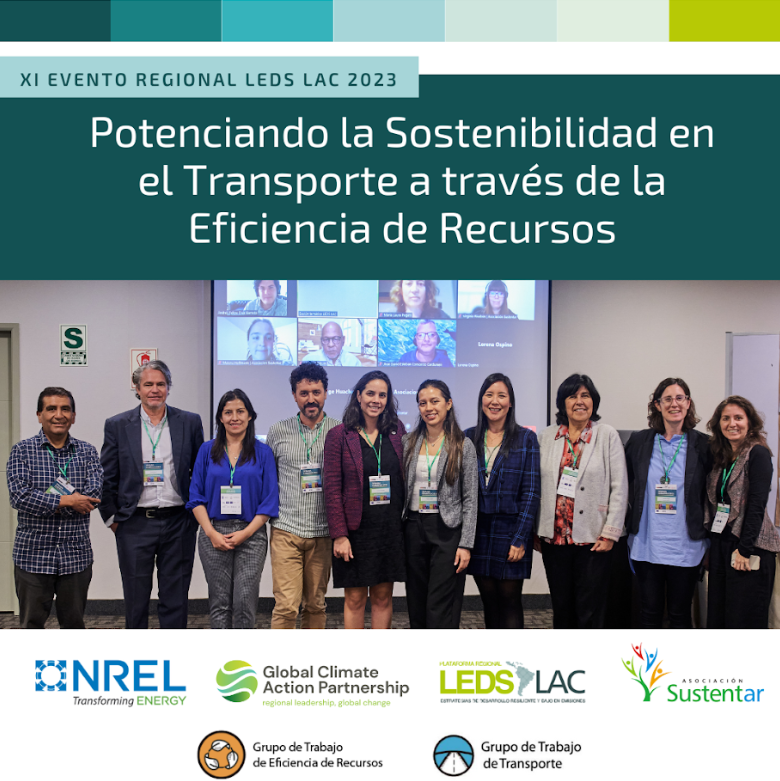
The objective of this session was to make visible the individual and collective actions of the TWG members in the decarbonization of mobility in Latin America and the Caribbean. From this approach, we seek to generate instances of articulation and collaboration among members and generate visibility of their projects.
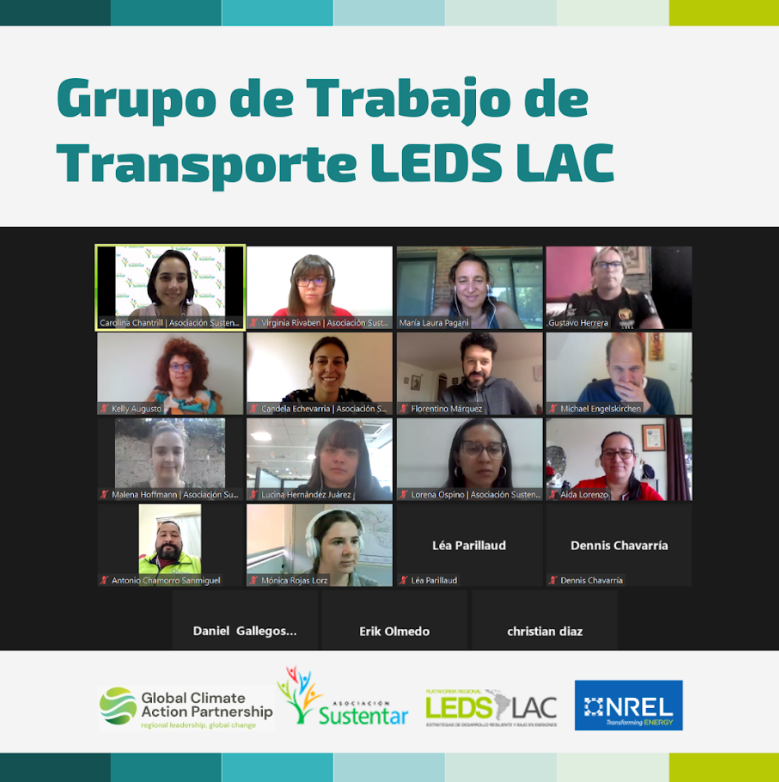
Organizers: Asociación Sustentar; Transport Working Group (GTT); ArticuLAC
The objective of this event was to present the web document "Energy and transport decarbonization nexus. Roles of public and private actors", developed collaboratively by ArticuLAC and the TWG, with contributions from members of both initiatives and representatives of other institutional partners. It includes a conceptual map that identifies the connections between different key elements at the intersection between the energy and transport sectors, analyzes the roles, interests and needs of public and private actors in some of these connections, and case studies that illustrate these relationships.
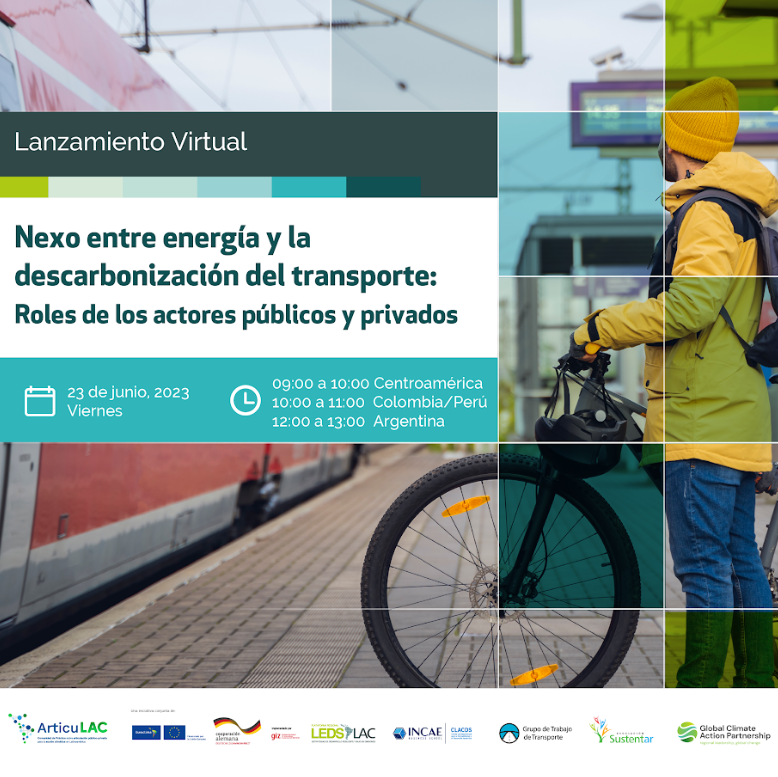
Organizers: iCities, Smart City Expo World Congress, Fira Barcelona
This event aimed to bring together experts from around the world to exchange solutions to address the decarbonization of urban mobility. In addition, future trends in terms of planning new modes of mobility were shared.
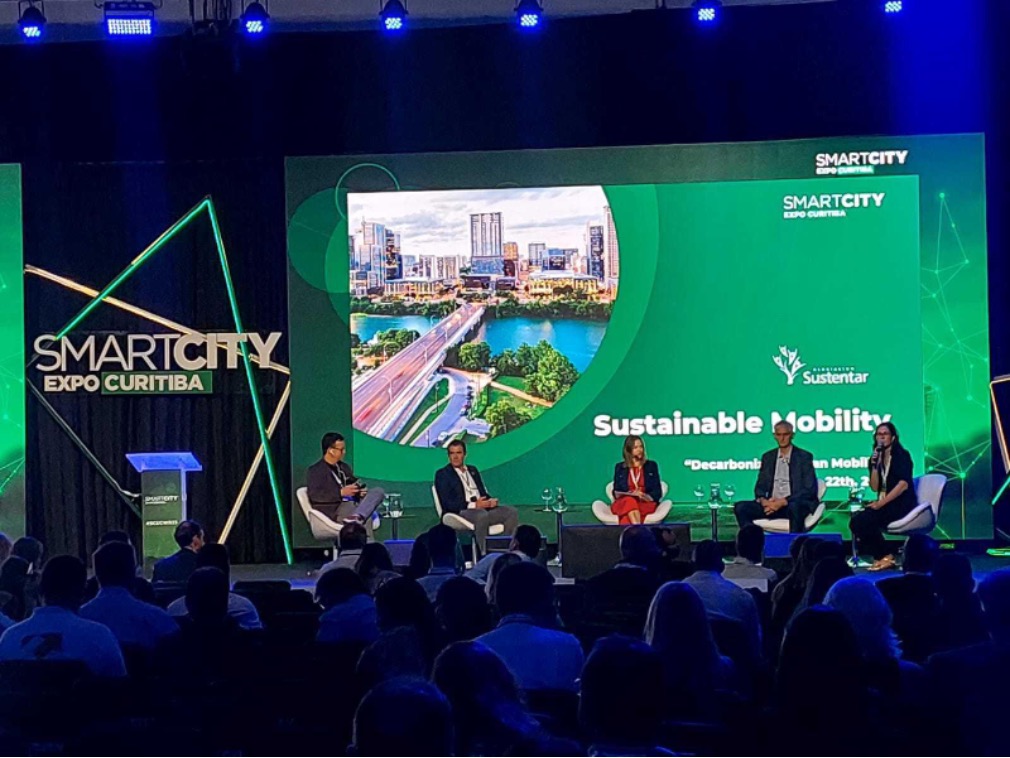
The purpose of this session was to communicate the news of the TWG and to discuss with the members of the community the activities that will be carried out in the first half of 2023.

Organizers: Ministry of the Environment of Chile; National Planning Department of Colombia; Economic Commission for Latin America and the Caribbean (ECLAC).
The purpose of this event was to exchange views on the progress made in the insertion of the circular economy in Latin American and Caribbean countries and the opportunities it offers to meet climate commitments while contributing to macroeconomic objectives related to GDP growth and job creation.
Co-organizers: Sustentar Association; Transport Working Group (TWG); Resource Efficiency Working Group (REWG)
This event highlighted challenges and experiences from the lens of circular models in transportation, exploring actions that can be taken by governments and the private sector, and highlighting the benefits of redesigning, extending the useful life and promoting the efficient use of raw materials and resources in the transportation transition.
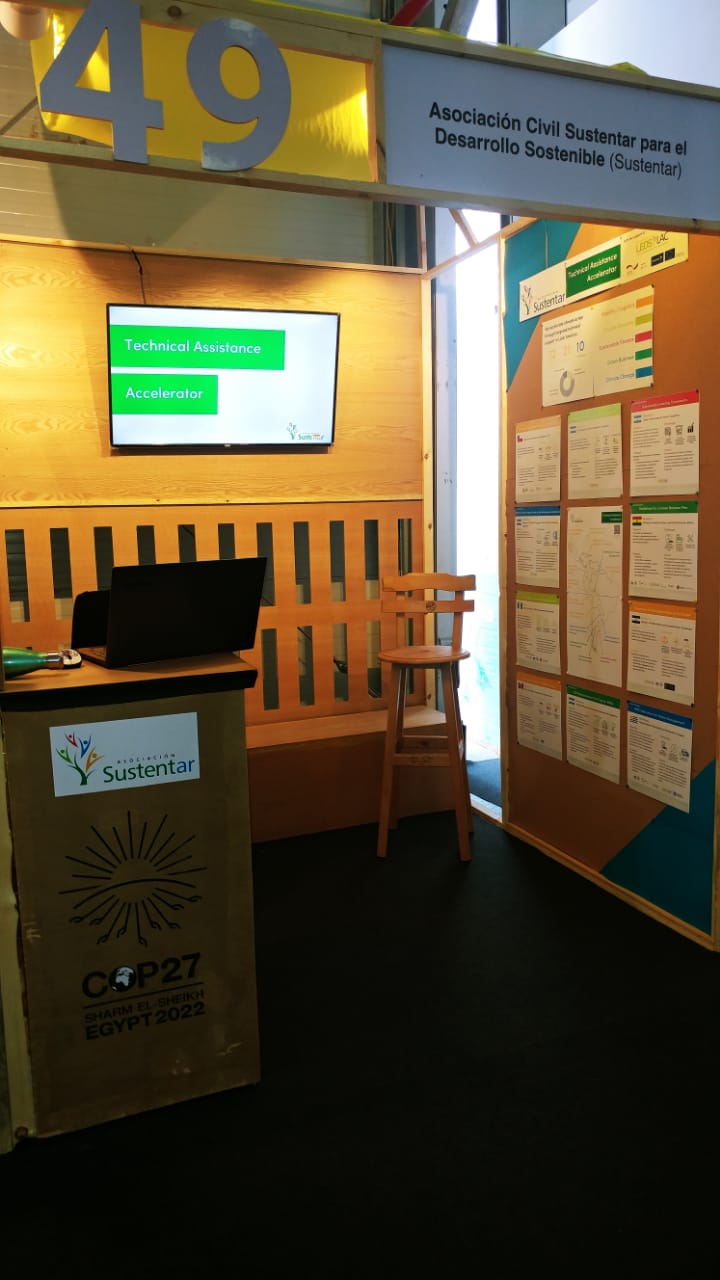
Co-organizers: International Union of Railways (UIC); European Cyclists' Federation (ECF); International Association of Public Transport (UITP); Transport Working Group (TWG); Sustentar Association (Sustentar); International Association of Public Transport (UITP); European Cyclists' Federation (ECF).
This session brought together policy makers, advocates and members of the business community to share their views on how best to achieve a broader system transformation that includes support for active travel and public and shared transport, which often lack priority and funding. In addition, best practices and examples of what is being done around the world to transform mobility were shared.
Co-organizers: United Nations Environment Programme (UNDP); Mobilidad Eléctrica Latinoamérica y el Caribe (MOVE ONU); Transportation Working Group (TWG) and Resource Efficiency Working Group (REWG); Asociación Sustentar
This event highlighted challenges and experiences from the lens of circular models in transportation, exploring actions that can be taken by governments and the private sector, and highlighting the benefits of redesigning, extending the useful life and promoting the efficient use of raw materials and resources in the transportation transition.
Co-organizers:
As the world moves from the target setting to the implementation phase of the NDCs, the subnational level will play a key role in making climate action on urban mobility a reality. To achieve the Paris Agreement targets, cities will need to drastically reduce emissions from transport. The event provided a space for public sector, private sector, and civil society representatives working or facilitating work at the local level to share their experiences on the projects they are undertaking to achieve this goal, how they are aligning with national and international targets, how they are coordinating different stakeholders, and what challenges they face. In a roundtable discussion, policy makers, representatives of the private sector and civil society will discuss success stories, challenges and recommendations to support cooperation among stakeholders.
Co-organizers:
In the face of rising global transport emissions, sustainable transport stakeholders discussed success factors for increasing ambition to move from the concept to the implementation of integrated and innovative low- or zero-carbon transport solutions needed for resilient recovery. The critical importance of integrated strategies within industry and transport modes, as well as with other domains such as energy, health, civil society and business, will be explored.
Organized by the TWG and the LEDS LAC Private Sector Community of Practice (ArticuLAC), a closed participatory workshop was held to develop a conceptual map of the role of private actors in the main points of connection between energy sustainability and decarbonization of transportation, as well as the public policy actions necessary for private actors to assume these roles. Work was done to identify opportunities for public-private articulation to achieve an effective integration of the energy and transportation sectors in the search for sustainability and carbon neutrality in the region. A knowledge document will be developed as a result of this workshop.
The workshop was organized within the APEC Project in collaboration with the LEDS LAC Transport Working Group. The main objectives of the workshop were to learn from experts on effective initiatives and collaboration of the transport and energy sectors, promote peer-to-peer learning within and across Latin America and the Caribbean (LAC) and Asia to advance the integration of the transport and energy sectors to deliver energy efficient mobility solutions.
The workshop lasted three days, with each session featuring a lecture by an expert on a specific electric mobility topic, followed by presentations by participants on successful and ongoing experiences in relation to electric micro mobility, light and heavy duty vehicles.
The webinar aimed to socialize the main findings and messages of SLOCAT's Global Status Report on Transport and Climate Change - 2nd edition, in order to connect sustainable low-carbon transport issues and actors with each other and with others, with a focus on urban sustainability, health, gender, renewable energy and behavioral change. The links between low-carbon and sustainable transport actions and global climate change and sustainability processes were discussed.
The TWG participated in the panel discussion and was part of the strategy team and the document review.
This closed event was carried out by the Clean Logistics Community of Practice of the Transportation Working Group (LEDS LAC). The main objectives of the event were to share the experiences of Rosario and Mexico City in the development of Good Practice Guides to improve the efficiency of urban freight transport; to generate a space for exchange and discussion on the most relevant aspects of initiatives aimed at improving energy efficiency in urban freight transport; and to disseminate the importance of addressing urban freight transport as an instrument to achieve resilient and low-emission transport.
The aim of the GIZ Transport and Climate Change Week 2021 was to foster the international exchange of knowledge and experience, peer-to-peer exchange and networking among professionals from developing countries and emerging economies. The main topics discussed were leveraging climate action and ambition in transport, green recovery in the transport sector and digitalization.
The TWG participated as a delegate and was represented by a speaker at the last session of the week.
The Latin America and Caribbean Climate Week sessions, promoted by the United Nations Environment Programme (UNEP) and the government of the Dominican Republic, are designed to reflect on climate action in the region, exploring challenges and opportunities and showcasing ambitious solutions. The TWG, together with SLOCAT and EUROCLIMA+, contributed to the organization of this week's Transport and Mobility thematic sessions. In addition, the TWG co-organized together with SLOCAT and REN21 an event entitled "Transforming urban transport with renewable energies to reach zero emissions".
The purpose of the workshop was to promote the exchange of experiences on the adoption of urban logistics strategies in LAC cities, with the aim of making visible the importance and impact of freight transport on urban mobility and the sustainability of cities, and to identify challenges and key aspects for the formulation and implementation of policies, plans and actions for sustainable urban logistics, with a focus on public-private articulation.
The objective of the workshop was to promote the exchange of experiences on the adoption of electric buses in LAC cities, in order to provide information and tools for the planning of electric mobility projects in public transportation and to promote a dialogue on the fundamental aspects for an effective implementation. The sessions were structured around the following focuses: Infrastructure and Technology, Financing and Articulation.
The conference was organized within the framework of the Decarbonization of Transport (DTi) initiative of the International Transport Forum (ITF) in Argentina. GTT collaborated in the organization and development of the conference. It consisted of 9 webinar sessions on how transport decarbonization policies can promote low-carbon economic growth and increased resilience of Argentina's transport system after the Covid-19 crisis.
Members of the TWG coordinating team were present at the Third Transport and Climate Change Week held in Berlin from March 2 to 6, 2020, with the aim of finding solutions from the transport sector to limit global warming. During the meeting, the exchange of knowledge and dialogue between 250 transport colleagues from all over the world was encouraged. In order to generate links for local projects that impact sustainable and efficient mobility, we invited officials from the cities of Bogota, Colombia and Rosario, Argentina.
In the framework of the LAC Climate Week in Salvador de Bahia (Brazil), the TWG organized the side event "Comprehensive solutions for the implementation of transport components in NDCs" to discuss how to integrate the climate agenda with the transport sector agenda to address key sectoral barriers to promote climate action.
The event was organized by LEDS LAC, LEDS GP and the EUROCLIMA+ Mobility Community of Practice.
Organized by the TWG and the LEDS LAC Private Sector Community of Practice, the parallel session "Mobilizing Private Finance for Implementing Low Emission Mobility Solutions" was held.. The objective of the session was to learn from experts and success stories on financing sustainable mobility initiatives in Latin America, to accelerate the transition to low-carbon mobility worldwide, to learn about the regulatory frameworks that have facilitated the transition to electromobility involving the private sector, and to facilitate the discussion on how to articulate the public and private sectors in the region.
The session was attended by the government of the city of Sao Paulo, the Inter-American Development Bank (IDB) and the BMW Group, who presented their progress, strategies and barriers to the development of electromobility projects in Latin American cities.
GTT launched the Sustainable Logistics Community of Practice on May 28 with an open webinar presenting trends in the transportation sector, concepts related to clean logistics and a case study on a national sustainable transportation plan.
In the framework of the Global NDC Conference 2019 in Berlin (Germany), the "Session on integrated energy and transport solutions to advance the NDC goals", organized by the GTT and the German Cooperation Agency (GIZ), took place. The session was attended by representatives of the governments of Argentina, Brazil and Uruguay, who presented their progress and challenges in the integration between the energy and transport sectors to deliver more ambitious mobility solutions to mitigate greenhouse gas emissions.
Group discussions were also held to identify solutions to the challenges of electric mobility, specifically in stakeholder engagement, implementation, and planning.
A closed working session with regional sustainable transport professionals was held on June 11 to provide a space for sustainable transport funders and developing country transport officials to discuss and generate future collaborations to advance transport and increase the ambition of the NDCs.
The session was attended by members of the Asian and Latin American platforms. Representatives from Sri Lanka, India, Bhutan, Argentina, Uruguay, Colombia, Costa Rica and Mexico presented their progress in the development and implementation of sustainable transport policies and the barriers they face in achieving the mitigation and adaptation targets set out in their NDCs.
Officials from GIZ, NDC Partnership, the International Transport Forum, the United States National Renewable Energy Laboratory - NREL, the SLoCaT platform and the NGO Asociación Sustentar also participated, presenting their areas of work and the possibility of support and technical assistance for the countries.
Within the framework of Climate Week LAC the Transportation Working Group was presenting the findings and work done in the LEDS LAC Electric Mobility Community of Practice (LEDS LAC EM CoP).
The MS CoP is an interactive network to address real-time policy, financing and technical barriers and solutions related to electric mobility in Latin America and the Caribbean.
The event "Sectoral and multilevel articulation to strengthen the implementation of NDCs in Latin America", was held in Santiago, Chile, on August 1, 2 and 3, 2018, as a joint effort between the project "Peer-to-peer dialogue to enhance the implementation of NDCs in Latin America in the framework of EUROCLIMA+" and the LEDS LAC Regional Platform. Considering the convergence in objectives between both parties, it was proposed to carry out this joint event with the objective of taking advantage of synergies and complementarities between both initiatives.
As part of the event, a session on sectoral experiences in the implementation of NDCs was held, dedicated to Transportation. The session was moderated by the Transport Working Group.
The VI LEDS LAC Regional Workshop was held in Mexico City, October 16-18, 2017, in the framework of the Second Latin American and Caribbean Climate Week. In the third block on Articulation of themes and sectors (parallel sessions), a session on "horizontal and vertical articulation for sustainable urban mobility" was developed. This session was co-organized with the LEDS GP Transport Working Group and consisted of a panel discussion with representatives from the National Energy Directorate of Uruguay and the Secretariat of Environment, Mexico City.
Within the framework of the priority theme of the LEDS LAC platform and the Panama UNFCCC- CAF Regional Collaboration Center on strengthening the transport components of the NDCs, the third thematic workshop on transport issues was held on September 19 and 20 in Lima, Peru. This time the theme focused on "Strengthening energy efficiency policies in the transport sector" in order to address the opportunities, challenges and lessons learned from intersectoral coordination and measurement and reporting systems in Latin America.
On November 29 and 30, the workshop "Linking the national and subnational levels to strengthen transport components in the NDCs" was held in the city of Bogota, with the support of the Resilient and Low Carbon Development Program and the Ministry of Transportation of Colombia. The workshop was attended by 24 participants, representing national and subnational levels of government from Colombia, Mexico, Argentina and Peru. During the workshop, the challenges and opportunities of bringing national level commitments and policies to the subnational level were analyzed, as well as how efforts at the city level contribute to national commitments.
The workshop took place over two days with a focus on generating linkages both between people working on LEDS as well as linking and generating synergies between different sectors, levels of governments, actors and approaches in addressing low carbon development issues. On the second day of the workshop, an Open Space entitled "Regional Dialogue on sustainable transport actions to mitigate climate change" was organized by SLoCaT and the Transport Working Group, followed by a Parallel Discussion Session on urban transport jointly organized by the Transport and National-Subnational Integration working groups in which they discussed The challenges and opportunities of national-subnational articulation in the implementation of sustainable urban transport actions in Latin America: Reflections and lessons learned from practice, and the Sectoral Action Plan for Transportation Mitigation with subnational integration perspectives of the Ministry of Transportation of Colombia was presented.
The Workshop "Challenges and opportunities of national - sub-national articulation in the implementation of sustainable urban transport actions in LAC" was organized by the LEDS LAC Platform together with the Ministry of Environment of Peru, with the support and funding of the United States Government and the Resilient and Low Carbon Development Program of Colombia. The main objectives of the meeting were to share experiences, lessons learned and success factors in the implementation of sustainable urban transport and land use planning actions, and to contribute to the construction of a common vision for national and subnational articulation to facilitate the implementation of low-carbon transport actions, with useful guidelines for the region. Fifteen experts from Argentina, Colombia and Peru participated in the workshop, which resulted in a report detailing the main strategies identified.
The Transport Working Group (TWG) and the Resource Efficiency Working Group (RWG) of the regional LEDS LAC platform work to provide capacity building support and improve the design and implementation of Nationally Determined Contributions (NDCs) in the region. In this context, the technical assistance (TA) provided under the Climate Action Accelerator of the LEDS LAC platform were presented as opportunities that support and contribute to the achievement of NDCs. Efforts were made to understand the replicability potential of the TAs presented in the webinar allowing participants to express their interest and opinions in this regard.
The Seminar was organized by the National Secretariat of Science and Technology of the Government of Guatemala in collaboration with the Transportation Working Group and the Bioenergy Community of Practice of LEDS LAC.
It consisted of 3 sessions whose objective was to stimulate the conversation in Guatemala on the relationship between energy and transportation, the energy demand of transportation and the need to generate comprehensive energy transition policies for sustainable mobility and low emissions. At the same time, the objective was to present global and regional trends and successful cases of the different approaches to sustainable mobility, the different alternatives for the decarbonization of transportation and the intersectoral work strategies to generate the necessary public policies for these purposes.
The webinar aimed to socialize the main findings and messages of the SLOCAT Global Status Report on Transport and Climate Change - 2nd edition, analyzing in detail the trends in transport demand and emissions, the measures and policies implemented and the impact of the COVID-19 pandemic in the Latin American and Caribbean region.
The Transportation Working Group was part of the discussion panel and the strategy and document review team.
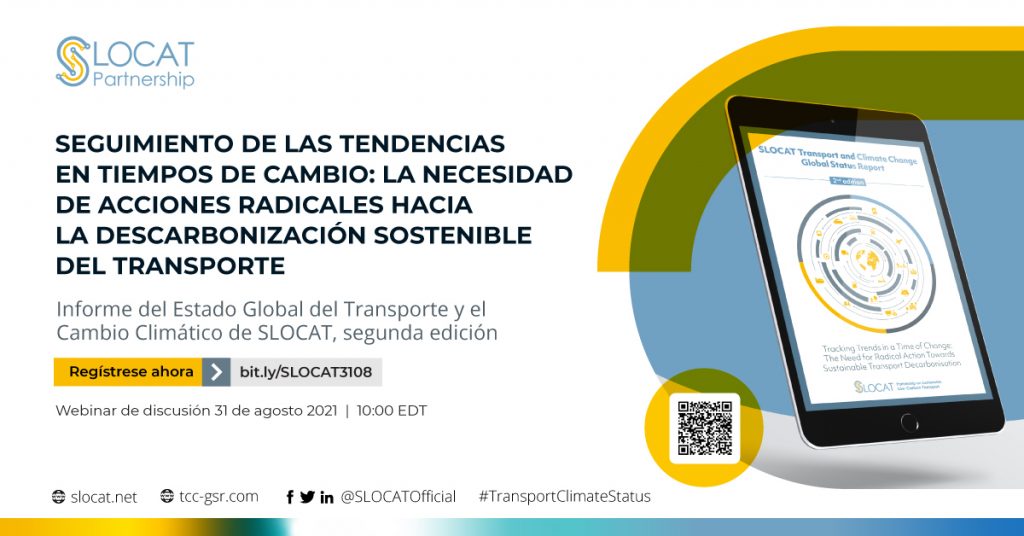
Organizers: Climate and Clean Air in Latin American Cities - Plus Program (CALAC+) and the Electric Mobility Community of the LEDS LAC Transportation Working Group (TWG).
This event aimed to share outstanding experiences in the implementation of zero-emission buses in Latin America. It also sought to create a space to share information on national and international funding sources with representatives of public transportation systems, as well as to inform about the various government incentives aimed at reducing the total cost of ownership.

The Seminar was organized by the National Secretariat of Science and Technology of the Government of Guatemala in collaboration with the Transportation Working Group and the Bioenergy Community of Practice of LEDS LAC.
It consisted of 3 sessions whose objective was to stimulate the conversation in Guatemala on the relationship between energy and transportation, the energy demand of transportation and the need to generate comprehensive energy transition policies for sustainable mobility and low emissions. At the same time, the objective was to present global and regional trends and successful cases of the different approaches to sustainable mobility, the different alternatives for the decarbonization of transportation and the intersectoral work strategies to generate the necessary public policies for these purposes.
The objective of the webinar was to present the agency's experiences, visions and strategies on the project to include electric vehicles in the fleet and to promote a space for discussion on the implementation of electromobility in the Metrobus to establish the guidelines for technological change in the region.
The TWG coordination shared the results of the APEC case study on the lessons learned from the planning of the transition to electrification of the BRT system in Mexico City.
The objective of this public webinar was to highlight the economic, social and environmental benefits that can be generated by linking the energy and transportation sectors and transitioning to efficient systems based on electric vehicles and renewable energies. The speakers presented a recently published roadmap that sets out a wide range of sustainable mobility solutions. They discussed a concrete and practical process that enables local stakeholders and community leaders to jointly identify the best possible development pathway to advance both sectors through their integration. In turn, they discussed how they plan to further advance their work and what the implementation of the new strategy will look like in specific island, city and country contexts.
Examples from Peru and Mexico, concrete achievements and lessons learned in this area were presented as essential to achieve the Sustainable Development Goals in Latin America and worldwide. In particular, Carolina Chantrill, TWG coordinator, presented the lessons learned from the case study on the electrification pilot project in the Mexico City Metrobus.
We also have these other 6 Communities of Practice:
The Transportation Community of Practice is co-organized with:
